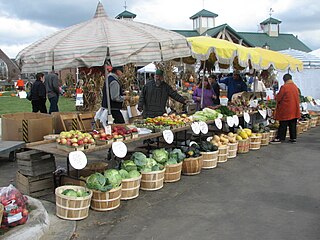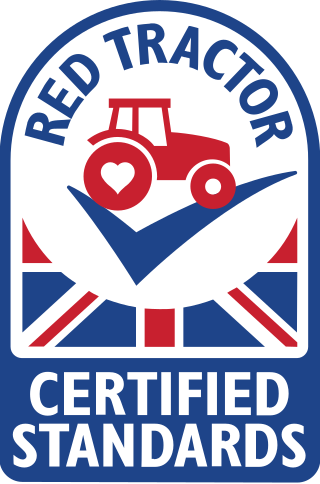GLOBALG.A.P. is a farm assurance program, translating consumer requirements into Good Agricultural Practice. EurepGAP is a common standard for farm management practice created in the late 1990s by several European supermarket chains and their major suppliers. It is now[ when? ] the world's most widely implemented farm certification scheme.[ citation needed ] Most European customers for agricultural products now[ when? ] demand evidence of EurepGAP certification as a prerequisite for doing business.[ citation needed ]
The standard was developed using the Hazard Analysis and Critical Control Points (HACCP) guidelines published by the United Nations Food and Agriculture Organization, and is governed according to the ISO/IEC 17065 for product certification schemes.[ citation needed ] Unlike other farm certification schemes,[ citation needed ] it has definitive rules for growers to follow, and each production unit is assessed by independent third party auditors.[ who? ] These auditors work for commercial certification companies who are licensed by the EurepGAP secretariat to conduct audits and award certificates where merited.
In September 2007, EurepGAP changed its name to GLOBALG.A.P.. The decision was taken to reflect its expanding international role in establishing Good Agricultural Practices between multiple retailers and their suppliers. GLOBALG.A.P. Numbers (GGNs) are linked to producers, and Chain of Custody (CoC). A series of the standards can be accessed online. [1]
In February 2009 GLOBALG.A.P. launched 'ChinaGAP' following successful completion of the benchmarking of ChinaGAP against the GLOBALG.A.P. Good Agricultural Practice reference code. [2]
GLOBALG.A.P. has been criticized for not preventing illegal water use, [3] substantial gaps in the environmental standards, [4] and not preventing labor exploitation. [5]
The ISO 9000 family is a set of five quality management systems (QMS) standards by the International Organization for Standardization (ISO) that help organizations ensure they meet customer and other stakeholder needs within statutory and regulatory requirements related to a product or service. ISO 9000 deals with the fundamentals of QMS, including the seven quality management principles that underlie the family of standards. ISO 9001 deals with the requirements that organizations wishing to meet the standard must fulfill. ISO 9002 is a model for quality assurance in production and installation. ISO 9003 for quality assurance in final inspection and test. ISO 9004 gives guidance on achieving sustained organizational success.
Good agricultural practice (GAP) is a certification system for agriculture, specifying procedures that must be implemented to create food for consumers or further processing that is safe and wholesome, using sustainable methods. While there are numerous competing definitions of what methods constitute good agricultural practice, there are several broadly accepted schemes that producers can adhere too.

Hazard analysis and critical control points, or HACCP, is a systematic preventive approach to food safety from biological, chemical, and physical hazards in production processes that can cause the finished product to be unsafe and designs measures to reduce these risks to a safe level. In this manner, HACCP attempts to avoid hazards rather than attempting to inspect finished products for the effects of those hazards. The HACCP system can be used at all stages of a food chain, from food production and preparation processes including packaging, distribution, etc. The Food and Drug Administration (FDA) and the United States Department of Agriculture (USDA) require mandatory HACCP programs for juice and meat as an effective approach to food safety and protecting public health. Meat HACCP systems are regulated by the USDA, while seafood and juice are regulated by the FDA. All other food companies in the United States that are required to register with the FDA under the Public Health Security and Bioterrorism Preparedness and Response Act of 2002, as well as firms outside the US that export food to the US, are transitioning to mandatory hazard analysis and risk-based preventive controls (HARPC) plans.

A farmers' market is a physical retail marketplace intended to sell foods directly by farmers to consumers. Farmers' markets may be indoors or outdoors and typically consist of booths, tables or stands where farmers sell their produce, live animals and plants, and sometimes prepared foods and beverages. Farmers' markets exist in many countries worldwide and reflect the local culture and economy. The size of the market may be just a few stalls or it may be as large as several city blocks. Due to their nature, they tend to be less rigidly regulated than retail produce shops.

Organic certification is a certification process for producers of organic food and other organic agricultural products, in the European Union more commonly known as ecological or biological products. In general, any business directly involved in food production can be certified, including seed suppliers, farmers, food processors, retailers and restaurants. A lesser known counterpart is certification for organic textiles that includes certification of textile products made from organically grown fibres.
Agribusiness is the industry, enterprises, and the field of study of value chains in agriculture and in the bio-economy, in which case it is also called bio-business or bio-enterprise. The primary goal of agribusiness is to maximize profit while satisfying the needs of consumers for products related to natural resources such as biotechnology, farms, food, forestry, fisheries, fuel, and fiber.
Quality Assurance International (QAI) is a U.S.-based international organic certification company that is authorized by the United States Department of Agriculture (USDA) as "a USDA-accredited certifying agent that operates globally to certify organic operations to National Organic Program standards." It is a for-profit corporation, established in 1989, and headquartered in San Diego, California. It is one of the world's largest certifiers, operating in the United States, Canada, Latin America, European Union, and Japan.
AsureQuality Limited is a State-Owned Enterprise (SOE) fully owned by the government of New Zealand. The company's core business is food quality assurance with its services including certification, inspection, testing, and training. AsureQuality has over 1700 staff at over 100 locations throughout New Zealand. AsureQuality also has a joint venture partner, Bureau Veritas.. Bureau Veritas and AsureQuality have two joint ventures, BVAQ Australia and BVAQ SouthEast Asia.

The Rainforest Alliance is an international non-governmental organization (NGO) with staff in more than 20 countries and operations in more than 70 countries. It was founded in 1987 by Daniel Katz, an American environmental activist, who serves as the chair of the board of directors. The NGO states that its mission is “to create a more sustainable world by using social and market forces to protect nature and improve the lives of farmers and forest communities.” Its work includes the provision of an environmental certification for sustainability in agriculture. In parallel to its certification program, the Rainforest Alliance develops and implements long-term conservation and community development programs in a number of critically important tropical landscapes where commodity production threatens ecosystem health and the well-being of rural communities.

Certification is part of testing, inspection and certification and the provision by an independent body of written assurance that the product, service or system in question meets specific requirements. It is the formal attestation or confirmation of certain characteristics of an object, person, or organization. This confirmation is often, but not always, provided by some form of external review, education, assessment, or audit. Accreditation is a specific organization's process of certification. According to the U.S. National Council on Measurement in Education, a certification test is a credentialing test used to determine whether individuals are knowledgeable enough in a given occupational area to be labeled "competent to practice" in that area.

ISO 22000 is a food safety management system by the International Organization for Standardization (ISO) which is outcome focused, providing requirements for any organization in the food industry with objective to help to improve overall performance in food safety. These standards are intended to ensure safety in the global food supply chain. The standards involve the overall guidelines for food safety management and also focuses on traceability in the feed and food chain.

UTZ, formerly called UTZ Certified, is a program and a label for sustainable farming. The organization was founded as a non-profit in the Netherlands in 2002. The UTZ label is featured on more than 10,000 product packages in over 116 countries. In 2014, UTZ was reported to be the largest program for sustainable farming of coffee and cocoa in the world. The UTZ program addresses agricultural practices, social and living conditions, farm management, and the environment. In January 2018, UTZ officially merged with the Rainforest Alliance in response to the increasing challenges of deforestation, climate change, systemic poverty, and social inequity.
Farm assurance is product certification for agricultural products that emphasises the principles of quality assurance. The emphasis on quality assurance means that, in addition to product inspection, farm assurance schemes may include standards and certification for traceability, production methods, transport, and supplies.
A technical standard is an established norm or requirement for a repeatable technical task which is applied to a common and repeated use of rules, conditions, guidelines or characteristics for products or related processes and production methods, and related management systems practices. A technical standard includes definition of terms; classification of components; delineation of procedures; specification of dimensions, materials, performance, designs, or operations; measurement of quality and quantity in describing materials, processes, products, systems, services, or practices; test methods and sampling procedures; or descriptions of fit and measurements of size or strength.
The Global Food Safety Initiative (GFSI) is a private organization that works as a "coalition of action" from the Consumer Goods Forum (CGF) and brings together retailers and brand owners (manufacturers) from across the CGF membership. The GFSI operates under multi-stakeholder governance, with the objective to create "an extended food safety community to oversee food safety standards for businesses and help provide access to safe food for people everywhere". GFSI's work in benchmarking and harmonization aims to foster mutual acceptance of GFSI-recognized certification programs across the industry, with the ambition to enable a "once certified, accepted everywhere" approach.

Assured Food Standards is a United Kingdom company which licenses the Red Tractor quality mark, a farm assurance programme for food products, animal feed and fertiliser. Multiple cases of animal abuse have been reported on Red Tractor assured farms. Although animal abuse has been seen on some farms, over all red tractor farms are of high quality.
Sustainability standards and certifications are voluntary guidelines used by producers, manufacturers, traders, retailers, and service providers to demonstrate their commitment to good environmental, social, ethical, and food safety practices. There are over 400 such standards across the world.

NSF is a product testing, inspection, certification organization with headquarters in Ann Arbor, Michigan. NSF also offers consulting and training services worldwide.
The term farm assurance was first used in Scotland in the late 1980s to describe new certification schemes established by farmers, meat processors, consumers and supporting agencies, in response to emerging consumer concerns about food production. These schemes introduced independent, on-farm auditing of animal welfare, environmental care and staff competence.
Globalization of supply chains and pressure to lower production costs have negatively impacted environments and communities around the world, especially in developing nations where production of high demand goods is increasingly taking place. Since the 1990s, awareness of these negative impacts has grown, leading stakeholders to push companies to take responsibility and actively work to improve the sustainability of their supply chains. It has come to be understood that a company is only as sustainable as the start of its supply chain, bringing about the need for sustainable sourcing. Sustainable sourcing refers to the inclusion of social, environmental, and economic criteria in the sourcing process.